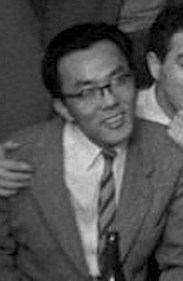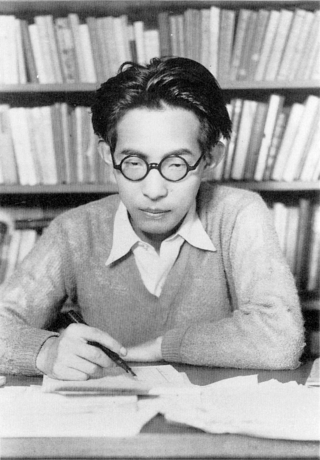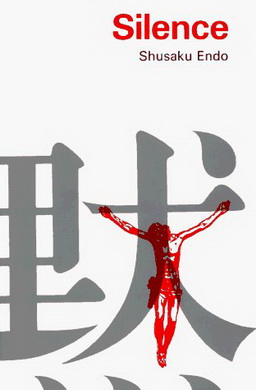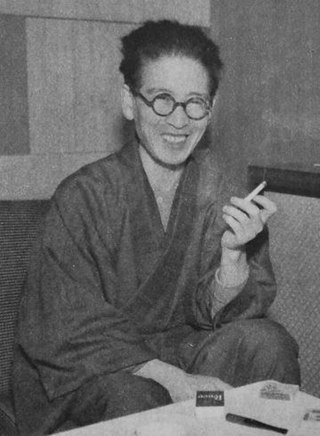Related Research Articles

Motojirō Kajii was a Japanese writer in the early Shōwa period known for his poetic short stories. Kajii's works included Remon, "Shiro no aru machi nite". Fuyu no hi and Sakura no ki no shita ni wa. His poetic works were praised by fellow writers including Yasunari Kawabata and Yukio Mishima. Today his works are admired for their finely tuned self-observation and descriptive power.

Shūsaku Endō was a Japanese author who wrote from the perspective of a Japanese Catholic. Internationally, he is known for his 1966 historical fiction novel Silence, which was adapted into a 2016 film of the same name by director Martin Scorsese. He was the laureate of several prestigious literary accolades, including the Akutagawa Prize and the Order of Culture, and was inducted into the Roman Catholic Order of St. Sylvester by Pope Paul VI.
The Third Generation of Postwar Writers is a classification in modern Japanese literature used to group writers who appeared in the postwar literary scene between 1953 and 1955. The term was coined by Yamamoto Kenkichi. They are well known for writing and reviving the prewar genre known as I-novels.
Scandal is a 1986 novel by Japanese author Shūsaku Endō. Endō was a Japanese Catholic writer whose works, among other things, covered various aspects of the Japanese Catholic experience. He was furthermore a member of the Japanese literary establishment, accounting for the importance of PEN meetings in the work. Aging in Japan was also addressed via commentary on the medical problems suffered by an elderly man.

Tatsuo Hori was a Japanese translator and writer of poetry, short stories and novels.
Juliet Winters Carpenter is an American translator of modern Japanese literature. Born in the American Midwest, she studied Japanese literature at the University of Michigan and the Inter-University Center for Japanese Language Studies in Tokyo. After completing her graduate studies in 1973, she returned to Japan in 1975, where she became involved in translation efforts and teaching.

Kōno Taeko was a Japanese writer who was active during the latter half of the 20th century. Kōno belonged to a generation of female Japanese writers who became more well-known in the 1960s and 70s. She established a reputation for herself as an acerbic essayist, a playwright, and a literary critic.

Tatsuhiko Shibusawa was the pen name of Shibusawa Tatsuo, a Japanese novelist, art critic, and translator of French literature active during the Shōwa period. Shibusawa wrote many short stories and novels based on French literature and Japanese classics. His essays about black magic, demonology, and eroticism are also popular in Japan.

Tatsuji Miyoshi was a Japanese poet, literary critic, and literary editor active during the Shōwa period of Japan. He is known for his lengthy free verse poetry, which often portray loneliness and isolation as part of contemporary life, but which are written in a complex, highly literary style reminiscent of classical Japanese poetry.

Silence is a 1966 novel of theological and historical fiction by Japanese author Shūsaku Endō. It tells the story of a Jesuit missionary sent to 17th-century Japan, who endures persecution in the time of Kakure Kirishitan that followed the defeat of the Shimabara Rebellion. The recipient of the 1966 Tanizaki Prize, it has been called "Endō's supreme achievement" and "one of the twentieth century's finest novels". Written partly in the form of a letter by its central character, the theme of a silent God who accompanies a believer in adversity was greatly influenced by the Catholic Endō's experience of religious discrimination in Japan, culture gap in France, and a debilitating bout with tuberculosis.
Abe Akira was a Japanese writer of short stories and novels.

Sei Itō, born Hitoshi Itō, was a Japanese Modernist writer of poetry, prose and essays, and a translator.
Howard Hibbett was a translator and professor of Japanese literature at Harvard University. He held the Victor S. Thomas Professorship in Japanese Literature.

Jeffrey Angles (ジェフリー・アングルス) is a poet who writes free verse in his second language, Japanese. He is also an American scholar of modern Japanese literature and an award-winning literary translator of modern Japanese poetry and fiction into English. He is a professor of Japanese language and Japanese literature at Western Michigan University. Among his awards are the Japan–U.S. Friendship Commission Prize for the Translation of Japanese Literature in 2009 for his translation of Forest of Eyes: Selected Poems of Tada Chimako by Tada Chimako and the 2017 Yomiuri Prize for Literature in the poetry category for his own Japanese-language poetry collection Watashi no hizukehenkosen.

The Church of Jesus Christ of Latter-day Saints was established in Japan in 1901 when the church's first missionaries arrived on August 12. Among them was Heber J. Grant, who was then a member of the Quorum of the Twelve and later became the church's 7th president. Horace S. Ensign, Louis A. Kelsch, and Alma O. Taylor accompanied Grant. The LDS Church's first baptism in Japan was on March 8, 1902, when Grant baptized Hajime Nakazawa, a former Kannushi. The Book of Mormon was translated three times. The first translation, which took over six years, was completed by Taylor in 1909. It was then recommended that the Book of Mormon be translated into bunshō, a more elegant literary style, which was done by Chōkō Ikuta in 1909, shortly before it was published and distributed. The third translation in 1957 was done by Tatsui Sato. In 1995, the Book of Mormon was translated again into a more colloquial style.
Masao Miyoshi was a scholar of literature and culture and Hajime Mori Endowed Chair in Japanese Language and Literature at the University of California, San Diego.

Silence is a 2016 epic historical drama film directed by Martin Scorsese from a screenplay by Jay Cocks and Scorsese, based on the 1966 novel of the same name by Shūsaku Endō, marking the third filmed adaptation of the novel. The film stars Andrew Garfield, Adam Driver, Tadanobu Asano, Ciarán Hinds and Liam Neeson. The plot follows two 17th-century Jesuit priests who travel from Portugal to Edo period Japan via Macau to locate their missing mentor and spread Catholic Christianity. The story is set in a time when it was common for the faith's Japanese adherents to hide from the persecution that resulted from the suppression of Christianity in Japan after the Shimabara Rebellion (1637–1638) against the Tokugawa shogunate. These are now called the Kakure Kirishitan, or "hidden Christians".
Geraldine Millais Harcourt was a New Zealand translator of modern Japanese literature.
Karen Van Dyck is an American literary critic and translator. She is currently the Kimon A. Doukas Professor of Modern Greek Language and Literature in the Classics Department of Columbia University in the City of New York.
References
- ↑ "The "Welding Link" of Culture - van C. Gessel". Archived from the original on 2012-04-24. Retrieved 2011-12-24.
- ↑ "BYU Devotional Address - Van Gessel (5/3/05)". BYUtv. Retrieved 2017-05-03.
- ↑ "Blog Archive » Van C. Gessel". Mormon Scholars Testify. Retrieved 2017-05-03.
- ↑ "| Brigham Young University". News.byu.edu. 2016-09-20. Retrieved 2017-05-03.
- ↑ Benson, Emma (5 June 2018). "Highlights from BYU colleges". The Daily Universe.
- ↑ "Announcement of Recipients of Japan-United States Friendship Commission Prize for the Translation of Japanese Literature and the Lindsley and Masao Miyoshi Translation Prize" (PDF). keenecenter.org. Retrieved 23 July 2023.
- ↑ "Finding God in the Silence - BYU College of Humanities". 8 May 2017.
- ↑ Derrick Clements Daily Herald (2017-04-26). "BYU professor credited as literary consultant on Scorsese's 'Silence' | Provo News". heraldextra.com. Retrieved 2017-05-03.
- ↑ "Fall 2015 by BYU Humanities". issuu. 2015-12-17. Retrieved 2017-05-03.